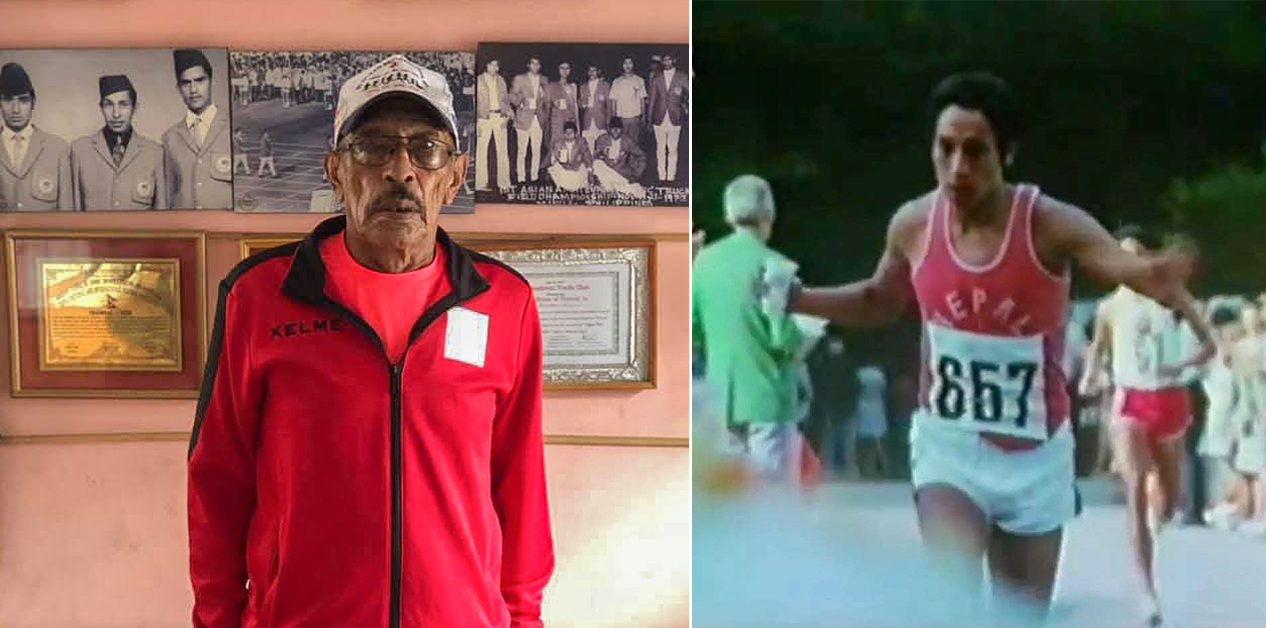

Jit Bahadur KC was hailed after winning the bronze medal at the first Asian Athletics Championships in Manila, the capital of the Philippines, in 1973. Upon his arrival in Kathmandu from Manila, the then Prime Minister Nagendra Prasad Rijal himself went to Tribhuvan International Airport to welcome him.
Grand prizes were announced for KC. Someone announced land for a house. Someone else, cash prizes. However, he received none of the announced rewards. The following year, his success was capitalized on not just by coaches, but also by officials of the National Sports Council, the Nepal Amateur Athletics Association, and the Nepal Olympic Committee, who received the Gorkha Dakshin Bahu (Order of the Gurkha Right Arm) and Trishakti Patta (Order of the Three Divine Powers) medals from then-King Birendra. But the state did not honor him.
Two years later, he won his second bronze medal for the nation at the second Asian Athletics Championships held in Seoul, South Korea. Even this time, he was neglected. Once again, the same sports officials used his name to receive another medal from King Birendra.
Jit Bahadur KC, who endured 15 years of neglect during the Panchayat era and continued to be neglected through the multiparty system and the Republican era, has finally been honored with a declaration of 2.5 million rupees by the new government established after the Gen Z movement. At the 123rd board meeting of the National Sports Council on Wednesday, when the Gen Z Youth and Sports Minister Bablu Gupta himself proposed the award, the Council officials were surprised. “The issue of him (Jit Bahadur) being unjustly treated since the Panchayat era came up. How can the current government just stand by and watch while the athlete who won Nepal’s first international medal has been neglected for so long? That is why we made the decision in the very first meeting,” said Youth and Sports Minister Gupta.
Jit Bahadur is the athlete who won the nation’s first medal in an international competition. At the age of 79, suffering from an enlarged heart, he visits the hospital every 15 days for health check-ups. He had lost all hope of receiving justice from the state at this age. However, upon hearing the news on Wednesday that the board meeting had decided to award him relief, he expressed his astonishment. “When Deepak Shrestha, President of the National and International Players Association, told me the news, I didn’t believe it. Later, the news itself came out,” Jit Bahadur told Nepal News.
In 2014, when Khil Raj Regmi was the Chairman of the Council of Ministers, the government honored marathon runner Baikuntha Manandhar and Taekwondo player Deepak Bista with 2.5 million rupees each.
At that time, the then leadership of the Council was criticized for omitting Jit Bahadur, the athlete who won Nepal’s first international medal. The following year, Taekwondo player Sangina Baidya was also honored with 1.5 million rupees with the approval of the cabinet meeting. Even then, the government paid no attention to Jit Bahadur.
Jit Bahadur, the undisputed number one Nepali marathon runner in the 1960s and 70s, was even named a medal contender by international media, including the BBC, at the 1972 Munich Olympics. However, after completing 22 kilometers of the race, his leg muscle separated, and he abandoned the race midway. Jit Bahadur was also considered a medal contender at the Asian Games held in Iran in 1974. However, Iran did not include the marathon event.
“Back then, when other runners from India and other parts of Asia heard he was coming to race, they would panic,” says Baikuntha Manandhar, another record-holding Nepali runner. “Honoring Jit Bahadur is also an honor for us.”
Jit Bahadur rose to prominence in Nepali sports after winning the gold medal at the National Championship held in Kathmandu in 1967. He remained Nepal’s number one athlete for about eight consecutive years. During this time, he won 14 gold medals in national competitions. Having participated in the Asian Games three times (in 1970, 1974, and 1978), Jit Bahadur created a sensation by completing the selection race for the Munich Olympics, held in Kathmandu on June 1, 1972, in two hours, 23 minutes, and 19.5 seconds. At the time, this record was considered excellent in world athletics.
P Kharel, a veteran journalist and professor, says, “When we were reporting (in the 1970s), for other players to defeat him was like chewing iron chickpeas.”